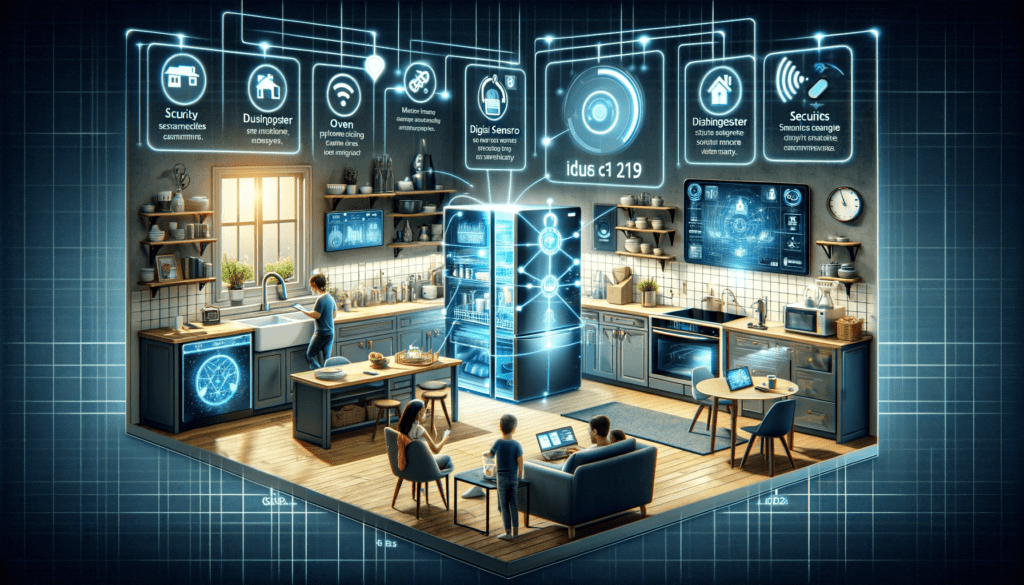Throw a stone and it's hard not to hit a device connected to the Internet these days, from our laptops and mobile phones to our cars and refrigerators. This explosion in connectivity is thanks to a transformative technology known as the Internet of Things (IoT). But how exactly does the Internet of Things change our lives?
Surprisingly, the impact is profound and far-reaching. IoT not only automates tedious tasks, but it also offers superior control and accessibility over myriad aspects of our daily lives. From smart homes equipped with sensors to intelligent kitchens filled with smart appliances, IoT has made our lives convenient, efficient, and secure. The question then is not merely about how the Internet of Things changes our daily existence, but also about how essential it has become to our modern ways of living.
Home Automation: Revolutionizing Comfort and Convenience
The inclusion of Home Automation in our daily routines has unarguably brought about a revolution in terms of comfort and convenience. These smart systems have waterfronted a technological paradigm shift, enabling household devices to respond intelligently to varying human needs. Today, lights automatically adjust their intensity based on the time of day, thermostats regulate room temperatures designed to your preference, and vacuum robots diligently keep homes clean, all thanks to the advancing Internet of Things (IoT).
Understanding the omnipresence of the Internet of Things also means understanding how this mammoth network changes our lives in more ways than one. It possesses the ability to convert ordinary homes into "smart" homes, facilitating tasks and activities to a previously unimagined extent. Thus, day-to-day living becomes streamlined, efficient, and customized to individual tastes and habits, helping us revel in the luxury of comfort and convenience, all while enhancing our quality of life.

Smart Appliances: The Cornerstones of an Intelligent Kitchen
Internet of Things or IoT continues to modernize our lives profoundly by revolutionizing domicile spaces, chiefly our kitchens. It’s no longer a distant reality or some science fiction concept; the introduction of smart appliances has indeed transformed traditional kitchens into what we now call 'intelligent kitchens'. These smart appliances, equipped with advanced technology, offer not only comfort and convenience but also elevate the entire cooking experience.
The implementation of smart appliances has created a new realm of possibilities. Refrigerators can now keep track of what's inside them, offer recipe suggestions based on the available ingredients, and even place orders when supplies run low. Ovens preheat according to the recipe's requirement, dishwashers run when electricity tariffs are at their lowest, and coffee makers brew your morning cup just in time for you to wake up. Smart appliances are undeniably changing our lives with these sweeping advancements, creating a harmonious blend of technology and daily life in our intelligent kitchens.
Enhancing Security: The Role of IoT in Protecting Your Home
One of the noteworthy improvements IoT has brought about in our daily lives is in the realm of home security. The advent of smart security systems, a direct product of IoT application, has transformed how we safeguard our homes. They provide real-time updates and quick responsiveness, thus ensuring our domiciles are safer than ever. Ranging from smart locks that can be controlled remotely to surveillance cameras that provide live feed right on our smartphones, these components work in harmony to create a fortress of safety.
Moreover, the beauty of IoT in home security extends beyond just deterring housebreaks or thefts. It encapsulates safeguards against potential fire outbreaks, gas leakages, or flooding by interfacing with relevant detection systems. This immersive security ecosystem can, therefore, help prevent not just property damage, but also save lives. Thus, the profound influence of Internet of Things clearly shows how it has fundamentally changed our lives: by making our homes securer than ever before.
Smart Home Hubs: Centralizing Control for Household Efficiency
Smart Home Hubs are becoming increasingly popular as people recognize the convenience and efficiency they bring to household management. As a key component of the IoT revolution, these hubs serve as centralized control systems for the various IoT devices in your home. From smart lights to intelligent kitchen appliances, the Smart Home Hub is the conductor that orchestrates the natural rhythm of a high-tech, connected home.
Whether you're automating your home lighting system, managing your energy usage, or creating multifaceted home automation programs, the Smart Home Hub can help. By centralizing control, it reduces the complexity of managing multiple devices, in turn simplifying your life. Indeed, in today's fast-paced world, Internet of Things changes our lives daily, offering comfort and convenience at the touch of a button, courtesy of Smart Home Hubs.
Voice-Activated Efficiency: How Smart Assistants are Changing the Way We Live
Smart Assistants, a significant breakthrough of the Internet of Things (IoT), are altering our way of life in remarkable ways. From scheduling appointments, managing tasks around the home, providing real-time traffic updates, to finding recipes, these digital helpers are taking over routine chores, leaving us free to focus on more important things. The ease of simply voicing a command to accomplish a task is a boon of technology that many have readily embraced.
The Smart Assistants aren’t just limited to personal assistance, they also play a pivotal role in home automation. They have the ability to integrate with various home devices such as thermostats, locks, lights, and more, enabling us to control them with just our voice. This cross-connectivity showcases how the Internet of Things changes our lives, not only enhancing our convenience but also promoting efficiency in our daily activities. Incessantly evolving, Smart Assistants promise to further refine and reinvent our daily living experience.

Elevating Quality of Life: The Subtle Impact of IoT on Daily Living
The Internet of Things (IoT) is subtly transforming our day-to-day lives in ways that greatly enhance the quality of life. The interoperability of smart devices and IoT technology is realizing efficiencies that were previously unattainable. Devices in our home and workplaces that are equipped with IoT technology can now communicate and exchange crucial user data among themselves. This allows them to make informed decisions in real time, saving users time and resources, ultimately improving the quality of life.
For example, consider a typical morning routine for an individual. Their IoT powered alarm clock wakes them up, the IoT-powered coffee maker in their kitchen starts brewing a fresh pot, while their IoT-connected car starts its engines and adjusts the internal temperature according to the weather for a comfortable drive. This seamless orchestration of tasks that were once manual is just one indication of how IoT is elevating the everyday quality of life, proving the subtle yet profound ways in which the Internet of Things changes our lives.
Seamless Connectivity: The Backbone of IoT Integration
Connectivity is indeed the central pillar that holds the structure of the Internet of Things (IoT), seamlessly weaving various technologies and devices together. This harmonious integration allows a thermostat to notify a smart air conditioner about the temperature variation, or a fitness device to connect to your smartphone and record health metrics, all through a simple, wireless network. This effortless and real-time interconnection of physical devices, data, and software provide an unprecedented level of automation and control, fundamentally altering the way we interact with technology and environment.
Moreover, it's crucial to appreciate the potential of such widespread connectivity in broadening the scope of how IoT changes our lives on a regular basis. For instance, smart home technologies leverage this seamless integration to revolutionize energy management and security systems, enhancing comfort and convenience while also reducing operational costs.
In cities, IoT networks improve urban planning and increase public safety through connected traffic lights and CCTV cameras. Therefore, it is not an exaggeration to say that this seamless connectivity stands as the spinal cord of the IoT, enabling endless possibilities and innovations in our day-to-day lives.
Data Sharing in IoT: Fueling Innovations in Everyday Technology
The transformative power of the Internet of Things (IoT) in altering our lives stems from its ability to share data across multitudes of devices. The simple process of connecting devices to the internet and enabling them to gather, analyze and exchange data builds the framework for an exciting world of tech innovations. The shift towards digitized societies owes much to this feature of IoT. At its heart, data sharing stands as the unsung hero in the race towards modernity.
Consider for a moment how IoT changes our lives multiple times daily; it streamlines various processes, from automating your home to monitoring vital biometrics for health. This is all enabled by the efficient sharing of data, connecting various aspects of our lives in real-time and feeding them into systems that learn and adapt to foster a more personalized, comfortable life. The real-time, constant data sharing and syncing across devices optimizes daily functions and allows technology to predict, analyze and fulfill our needs in a seamless, efficient manner.
The data sharing capabilities of IoT are not just limited to personal comfort and automation. They also extend to various sectors, including healthcare, transportation, agriculture, energy management and more. The integration of IoT in these sectors has resulted in significant improvements in efficiency and productivity.
- In healthcare: Real-time monitoring through connected devices can save lives in emergency situations by providing critical medical data when needed. It allows for remote health monitoring, predictive analysis based on patient's past health records, faster diagnosis and personalized treatment plans.
- In transportation: Data shared between vehicles, traffic management systems and GPS can optimize route planning for reduced travel time and fuel consumption. This results in improved logistics management as well as safer roads due to real-time updates on road conditions.
- In agriculture: IoT enabled smart farming uses sensors to collect data about soil moisture levels, crop growth etc., which is analyzed for precision farming practices that increase yield while reducing waste.
- Energy Management: Smart grids use real-time information from consumers' usage patterns to balance power demand with supply effectively. This reduces energy wastage significantly while ensuring a constant electricity supply even during peak times.
Data sharing via IoT has the potential to revolutionize our everyday life by making technology work smarter for us – predicting our needs before we realize them ourselves; adapting systems automatically according to changing circumstances; optimizing resources through efficient processes; enabling seamless communication between devices; fostering innovation across all sectors.
However, such extensive data sharing brings up concerns regarding privacy & security issues too - like unauthorized access or misuse of personal information - which need adequate measures for prevention & mitigation.
- Data Sharing forms the backbone of the Internet of Things (IoT), driving technological innovations across multiple fields.
- Its impact extends beyond personal convenience into areas like healthcare, transportation & agriculture where it improves efficiency & productivity.
- However careful consideration must be given towards addressing privacy concerns associated with widespread data sharing.
The Technological Revolution of IoT: A New Era in Daily Connectivity
The Internet of Things (IoT) can be referred to as the Technological Revolution shaping the 21st century. Everything from smartphones and wearables to appliances and vehicles are now connected to a network, creating a web of interconnected devices that continuously interact and exchange data. The Technological Revolution offers us the ability to manage and control these devices remotely, leading to greater convenience, safety, and efficiency in our everyday lives.
This Technological Revolution isn't just changing the way we live but also how we interact with the world around us. Small, mundane tasks such as turning off lights or adjusting thermostats can now be done from anywhere using a smartphone. By embedding internet connectivity into devices, we can control, automate, and optimize tasks to save time, reduce energy consumption, and even make services more customer-centric. These internet of things changes result in convenience and efficiency, shaping our experiences and improving our quality of life.
FACTS AND FIGURE HOW INTERNET OF THINGS CHANGES OUR LIFE: REAL STATS
| Fact/Figure | Statistic |
|---|---|
| Smart Home Devices Shipped in 2022 | 871 million |
| Predicted IoT Market Size in 2023 | $1.1 trillion |
| IoT Market Valuation in 2020 | $742 billion |
| Predicted IoT Retail Market by 2025 | $35.5 billion |
| Projected Increase in IoT Devices by 2027 | 1.4 trillion USD market size |
| IoT Device Attacks Increase Since 2018 | 215.7% |
| Global IoT Healthcare Market by 2024 | $14 billion |
| IoT in Agriculture Market by 2030 | $30 billion |
| Percentage of IoT Usage in North America, Western Europe, and China | 67% |
| IoT Security Concerns Reducing Spend | Up to 80% due to lack of prioritization |
| IoT Devices Worldwide | 31 billion |
| New Cars Connected via IoT by 2040 | 90% |
| IoT Adoption Rate in Industrial Manufacturing by 2020 | 80% |
| IoT Contribution to US GDP Boost | 10% |
| Percentage of Retailers Benefiting from IoT | 94% |
| Number of Active IoT Devices by 2030 | Over 25.4 billion |
| IoT Data Generated by 2025 | 79.4 zettabytes |
FAQs
What is the role of IoT in home automation?
IoT plays a major role in home automation by creating a network of devices that can communicate and interact with each other. This allows users to control various aspects of their home such as lighting, heating, and security directly from their smartphones or through voice commands.
How are smart appliances contributing to the intelligent kitchen concept?
Smart appliances contribute to the concept of an intelligent kitchen by offering increased functionality and convenience. For example, a smart refrigerator can track food items, their expiry dates, and even suggest recipes. An IoT-enabled oven can be preheated remotely and alert the user when the food is cooked.
Can IoT enhance home security systems?
Yes, IoT enhances home security significantly. It allows homeowners to monitor their property remotely through connected cameras, sensors, and alarms. It can also notify them in case of any unusual activity, providing an extra layer of security.
What is a smart home hub and how does it improve household efficiency?
A smart home hub is a device that serves as the central point of control for all connected devices in a home. It improves household efficiency by allowing users to manage all their smart devices from one place, set automation rules for device behavior, and even save energy by ensuring devices are only active when needed.
How are smart assistants changing the way we live?
Smart assistants, powered by AI, are changing the way we live by providing voice-activated control over numerous devices and services. They can perform tasks such as setting reminders, playing music, providing news updates or even controlling other smart home devices, making everyday life more convenient.
What is the impact of IoT on daily living?
The impact of IoT on daily living is subtle yet profound. It brings about increased convenience, efficiency, and security. It can assist in household chores, help save energy, provide personalized experiences and even help monitor health and fitness.
How does seamless connectivity contribute to IoT integration?
Seamless connectivity is the backbone of IoT integration. It allows various devices and systems to communicate and work together, creating a cohesive and efficient ecosystem. This interconnectivity is what makes smart homes and other IoT applications possible.
How does data sharing fuel innovations in everyday technology through IoT?
Data sharing in IoT enables devices to learn from data patterns and user behavior, leading to continuous improvements and personalized experiences. It fuels innovation by driving the development of new features, capabilities, and services based on user needs and preferences.
What is the significance of the technological revolution brought about by IoT?
The technological revolution brought about by IoT signifies a new era in daily connectivity. It has transformed ordinary household items into smart devices, created interconnected ecosystems, and has changed the way we live, work, and interact with our surroundings.




